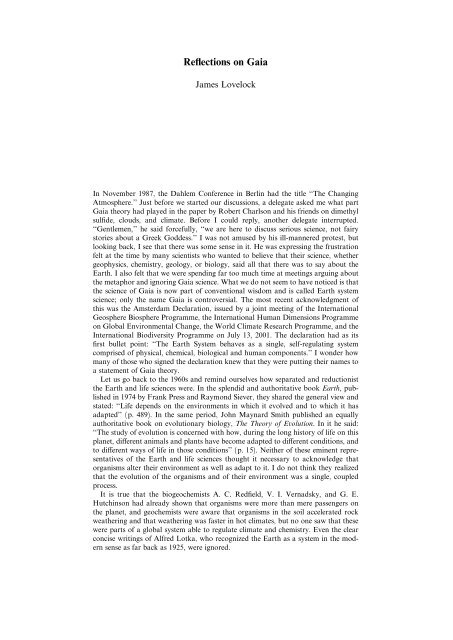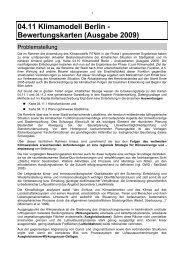Die Gaia-Hypothese - WordPress – www.wordpress.com
Die Gaia-Hypothese - WordPress – www.wordpress.com
Die Gaia-Hypothese - WordPress – www.wordpress.com
Sie wollen auch ein ePaper? Erhöhen Sie die Reichweite Ihrer Titel.
YUMPU macht aus Druck-PDFs automatisch weboptimierte ePaper, die Google liebt.
Reflections on <strong>Gaia</strong><br />
James Lovelock<br />
In November 1987, the Dahlem Conference in Berlin had the title ‘‘The Changing<br />
Atmosphere.’’ Just before we started our discussions, a delegate asked me what part<br />
<strong>Gaia</strong> theory had played in the paper by Robert Charlson and his friends on dimethyl<br />
sulfide, clouds, and climate. Before I could reply, another delegate interrupted.<br />
‘‘Gentlemen,’’ he said forcefully, ‘‘we are here to discuss serious science, not fairy<br />
stories about a Greek Goddess.’’ I was not amused by his ill-mannered protest, but<br />
looking back, I see that there was some sense in it. He was expressing the frustration<br />
felt at the time by many scientists who wanted to believe that their science, whether<br />
geophysics, chemistry, geology, or biology, said all that there was to say about the<br />
Earth. I also felt that we were spending far too much time at meetings arguing about<br />
the metaphor and ignoring <strong>Gaia</strong> science. What we do not seem to have noticed is that<br />
the science of <strong>Gaia</strong> is now part of conventional wisdom and is called Earth system<br />
science; only the name <strong>Gaia</strong> is controversial. The most recent acknowledgment of<br />
this was the Amsterdam Declaration, issued by a joint meeting of the International<br />
Geosphere Biosphere Programme, the International Human Dimensions Programme<br />
on Global Environmental Change, the World Climate Research Programme, and the<br />
International Biodiversity Programme on July 13, 2001. The declaration had as its<br />
first bullet point: ‘‘The Earth System behaves as a single, self-regulating system<br />
<strong>com</strong>prised of physical, chemical, biological and human <strong>com</strong>ponents.’’ I wonder how<br />
many of those who signed the declaration knew that they were putting their names to<br />
a statement of <strong>Gaia</strong> theory.<br />
Let us go back to the 1960s and remind ourselves how separated and reductionist<br />
the Earth and life sciences were. In the splendid and authoritative book Earth, published<br />
in 1974 by Frank Press and Raymond Siever, they shared the general view and<br />
stated: ‘‘Life depends on the environments in which it evolved and to which it has<br />
adapted’’ (p. 489). In the same period, John Maynard Smith published an equally<br />
authoritative book on evolutionary biology, The Theory of Evolution. In it he said:<br />
‘‘The study of evolution is concerned with how, during the long history of life on this<br />
planet, di¤erent animals and plants have be<strong>com</strong>e adapted to di¤erent conditions, and<br />
to di¤erent ways of life in those conditions’’ (p. 15). Neither of these eminent representatives<br />
of the Earth and life sciences thought it necessary to acknowledge that<br />
organisms alter their environment as well as adapt to it. I do not think they realized<br />
that the evolution of the organisms and of their environment was a single, coupled<br />
process.<br />
It is true that the biogeochemists A. C. Redfield, V. I. Vernadsky, and G. E.<br />
Hutchinson had already shown that organisms were more than mere passengers on<br />
the planet, and geochemists were aware that organisms in the soil accelerated rock<br />
weathering and that weathering was faster in hot climates, but no one saw that these<br />
were parts of a global system able to regulate climate and chemistry. Even the clear<br />
concise writings of Alfred Lotka, who recognized the Earth as a system in the modern<br />
sense as far back as 1925, were ignored.




